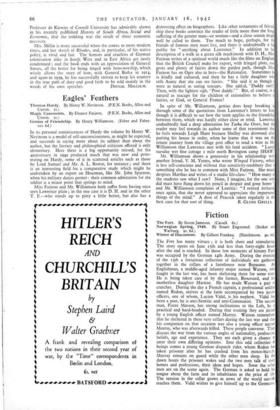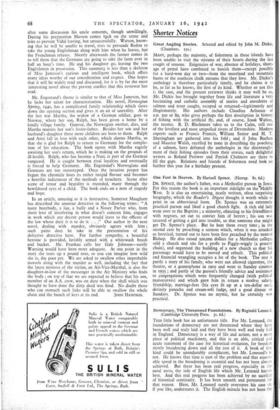Fiction
The Fort. By Storm Jameson. (Cassell. 6s.)
Winter of Discontent. By Gilbert Frankau. (Hutchinson. gs. 6d.) The Fort has many virtues ' • it is both short and stimulating. The story opens on June 13th and less than forty-eight hours after the end is reached. In those few moments of history Paris was occupied by the German 14th Army. During the evening of the 13th a fortuitous collection of individuals are gathered together in the cellars of a farmhouse near Bapaume. An Englishman, a middle-aged infantry major named Watson, who fought in the last war, has been sheltering there for some time He is being taken care of by the farmer, Broussard, and his motherless- daughter Martine. He has made Watson a pair of crutches. During the day a French captain, a professional soldier named Redon, arrives at the farm accompanied by two junior officers, one of whom, Lucien Vidal, is his nephew. Vidal has been a poet, he is anti-Semitic and anti-Communist. The second man, Pierre Masson, has strong inclinations to the Left, he is practical and hard-headed. During that evening they are joined by a young English officer named Murray. Watson remembers that he sheltered in these very cellars during the last war and that his companion on that occasion was also a young officer named Murray, who was afterwards killed. These people converse. They discuss the war from the various angles of nationality, profession, beliefs, age and experience. They are each given a chance to utter their own differing opinions. Into this odd collection of beings comes a young German dispatch rider, whom Redon taken prisoner after he has crashed from his motor-bicycle. Murray remains on guard while the other men sleep. In the dawn hours the prisoner wakes and the two men talk of their homes and professions, their ideas and hopes. Soon the other men are on the scene again. The German is asked to hold hi5 tongue about the farm and its inhabitants as the price of life. The tension in the cellar grows as news of the world outside reaches them. Vidal wishes to give himself up to the Germans;
after some discussion his uncle consents, though unwillingly. During his preparation Masson comes bp.ck on the scene and tries to prevent Vidal leaving, but unsuccessfully. Watson, know- ing that he will be unable to travel, tries to persuade Redon to take the young Englishman along with him when he leaves, but the Frenchman refuses. Shortly afterwards the farmer comes in to tell them that the Germans are going to take the farm over in half an hour's time. He and his daughter go, leaving the two Englishmen in possession. This summary is less than a skeleton of Miss Jameson's curious and intelligent book, which offers many ideas worthy of our consideration and respect. One hopes that it will be widely read and discussed, for it is by far the most interesting novel about the present conflict that this reviewer has read.
Mr. Engstrand's theme is similar to that of Miss Jameson, but he lacks her talent for characterisation. His novel, Norwegian Spring, 1940, has a complicated family relationship which slows down the opening section and gives it an air of unreality. After the last war Martha, the widow of a German soldier, goes to Norway, where her son, Ralph, has been given a home by a kindly village family. Gunvar, the Norwegian mother, dies, and Martha marries her son's foster-father. _Besides her son and her husband's daughter three more children are born to them. Ralph and Agtri fall in love with each other, which alarms Martha, so that she is glad for Ralph to return to Germany for the comple- tion of his education. The book opens with Martha eagerly awaiting her son's return, which he is making on the grounds of ill-health. Ralph, who has become a Nazi, is part of the German vanguard. He is caught between rival loyalties and eventually is forced to help Germany. Mr. Engstrand's Norwegians and Germans are too stereotyped. Once the invasion proper has begun the chronicle loses its rather insipid flavour and becomes a horrible indictment of the methods of treachery. Scene after scene of terror and brutality is recorded, many through the bewildered eyes of a child. The book ends on a note of tragedy and hope.
In an article, amusing as it is instructive, Somerset Maugham has described the amateur detective in the following terms : "A nasty busybody, a liar, a bully and a Nosey Parker who, from sheer love of interfering in what doesn't concern him, engages in work which any decent person would leave to the officers of the law whose duty it is to do it. . . ." Our author in the next novel, dealing with murder, obviously agrees with him ; such pains does he take in the presentation of his defective detective hero. For further sympathy, a beautiful heroine is provided, lavishly armed with a whitewash brush and bucket. Mr. Frankau calls her Gale Johnson—surely Warning would have been more adequate. At one point in the story she tears up a pound note, so you can imagine how wild she is, the poor pet. We are asked to swallow other improbable morsels along with the murder as well, including the fact that the latest mistress of the victim, an Air-Vice-Marshal, is also the daughter-in-law of the messenger in the Air Ministry who finds the body ; on top of that we are expected to believe that'his son, member of an A.A. crew, was on duty when the shell which was thought to have done the dirty deed was fired. No doubt those who can stomach such links will be able to swallow the whole chain and the bunch of keys at its end. JOHN HAMPSON.



























 Previous page
Previous page